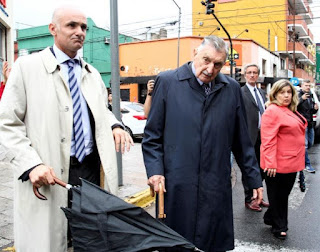 The first Ford assembly plant in La Boca, Buenos Aires, c. 1921.
The first Ford assembly plant in La Boca, Buenos Aires, c. 1921.Ford Motor Argentina (click here) is a subsidiary of Ford Motor Company and was founded in Buenos Aires in 1913.[1] Its first products were Model Ts assembled from complete knock down (CKD) kits provided by Ford Motor Company in 1917. Nevertheless, Ford Motor Argentina is best known in more recent times for producing the Ford Focus and, previously, the Argentine version of the Ford Falcon,[2] originally a US model introduced in Argentina in 1961, but adapted to the Argentine market....
Ford was making money while this was going on, so for all intentions and purposes this inhumane activity was sanctioned by the company.
December 11, 2018
by Cassandra Garrison and Nicolas Misculin
Former Ford Motor Co. security chief Hector Sibilla leaves the court after the trial in Buenos Aires, Argentina, December 11, 2018.
...It is the first time former executives of a multinational company (click here) working in Argentina during the dictatorship have been convicted of crimes against humanity, one of the lawyers, Tomas Ojea Quintana, told Reuters in a telephone interview.
“It is clear that Ford Motor Company had control of the Argentinian subsidiary during the ‘70s. Therefore, there is a direct responsibility of Ford Motor Company and that might give us the possibility to bring the case to the U.S. courts,” Ojea Quintana said....
I wonder if the USA Congress held any hearings on this. If not, they should now.
December 11, 2018
By Uki Goni
...Although nearly 1,000 former military officers (click here) have been imprisoned over crimes committed under military rule, Tuesday’s verdict in a Buenos Aires court marked the first time executives of a foreign company have been convicted.
Former Ford executive Pedro Müller, 86, and Héctor Sibila, 90, a former Ford security manager, were sentenced to 10 and 12 years, respectively, for the kidnapping and torture of 24 employees at Ford’s General Pacheco plant outside Argentina’s capital city.
Testimony at the trial showed the executives provided the military with lists, addresses and photo IDs of workers they wanted arrested and even provided space for an illegal detention centre at the plant where the abductees could be interrogated.
“The company acted in a coordinated manner with the military,” the prosecution alleged.
Former army general Santiago Riveros, who oversaw repression in the General Pacheco area, was convicted to 15 years for the same crimes committed at the Ford plant. All three will benefit from house arrest because of their advanced age.
“Ford is an example of civilian-military state terrorism operations,” tweeted Hijos Capital, an association representing the children of the disappeared of the capital city of Buenos Aires.
The trial got under way last December in a tribunal packed with former employees of the General Pacheco plant. Prosecutors alleged that the plant was used as a clandestine detention centre.



